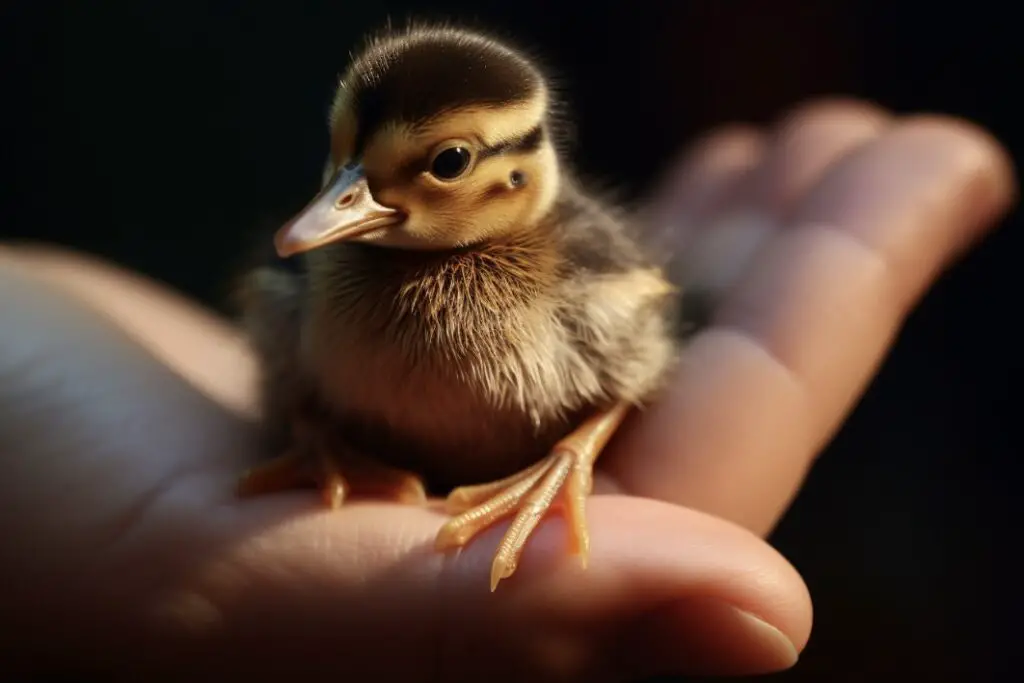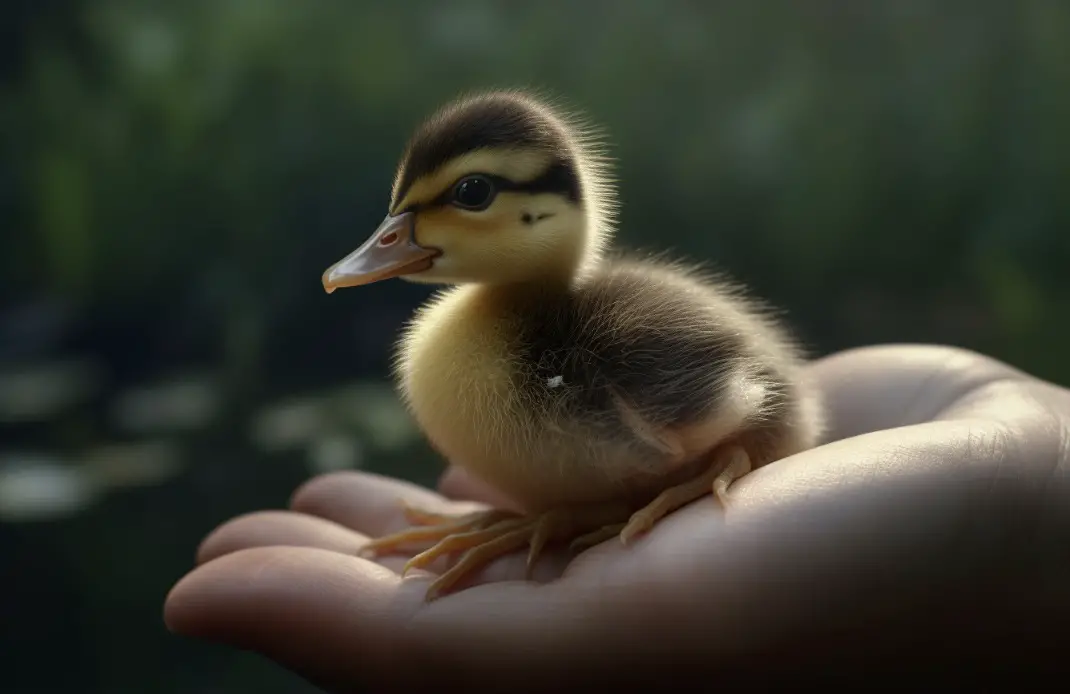Do ducks kill their babies if humans touch them?
The short answer is no.
However, there is so much more to this question than a simple yes or no answer. As an expert in the field of animal behavior and a lover of all things duck-related, I’ve been asked this question countless times.
In this post, I’ll delve deeper into the world of ducks and their fascinating behavior, shedding light on some common misconceptions and sharing my own experiences with these wonderful creatures.
Understanding Duck Behavior
Parental Instincts in Ducks
Ducks, like many bird species, have strong parental instincts. This is especially true for the mother duck or “hen,” who is responsible for incubating the eggs and caring for the ducklings once they hatch. Mother ducks are known to be fiercely protective of their young, often putting their own lives at risk to defend their offspring from predators.
Imprinting and Social Bonds
Imprinting is a crucial aspect of duck behavior, particularly for young ducklings. Shortly after hatching, ducklings will form a strong social bond with the first moving object they see, which is usually their mother.

This bond is vital for the survival of the ducklings, as it ensures that they stay close to their mother and follow her lead.
However, imprinting is not exclusive to mother ducks. Ducklings can also imprint on humans or other animals, which can lead to some interesting and heartwarming interactions.
The Myth of Human Touch
It is generally advised not to touch hatchlings in a nest, especially in the case of wild birds or other wildlife, for several reasons:
- Human scent: When humans touch hatchlings or their nests, they can leave behind their scent. This can potentially attract predators to the nest, putting the hatchlings at risk.
- Disease transmission: Human hands may carry bacteria, viruses, or other pathogens that can be harmful to the hatchlings. Touching them can potentially transmit these pathogens and cause infections or diseases.
- Stress and abandonment: Handling hatchlings can be extremely stressful for them, as they are not accustomed to human contact. The stress of being handled can disrupt their normal behavior and development. Additionally, the scent of humans on the hatchlings or their nest can lead the parents to abandon them, as they may perceive them as a threat.
- Legal protection: Many species of birds and other wildlife are protected by law, and disturbing their nests or hatchlings can be illegal without proper authorization. Interfering with wild animals, even with good intentions, can disrupt their natural behaviors and ecosystems.
While it is important to care for and protect wildlife, it is generally best to observe from a distance and allow nature to take its course.
However, the mother will not necessarily abandon their babies if touched!
If you have concerns about hatchlings or their nest, it is recommended to contact local wildlife authorities or organizations who can provide guidance and assistance.
Where Did the Myth Come From?
The myth that ducks will kill or abandon their babies if a human touches them likely stems from a general misunderstanding of animal behavior.
Many people believe that wild animals will reject their offspring if they detect the scent of a human on them.
This is simply not true, at least not for ducks. It does not mean that they enjoy your presence or scent though…
The Reality: Ducks Do Not Kill Their Babies After Human Touch
Ducks do not kill or abandon their babies if a human touches them. While it’s true that ducks have a keen sense of smell, they do not rely solely on scent to recognize their offspring. Instead, they rely more on visual and auditory cues.
In my experience, I have handled ducklings in numerous situations, such as rescuing them from dangerous situations or helping them reunite with their mothers. In most cases, the mother duck readily accepted the duckling back into her care, showing no signs of distress or rejection.
How to Safely Interact with Ducks and Ducklings
While it’s clear that ducks won’t kill their babies if humans touch them, it’s essential to approach any interaction with wild animals responsibly and respectfully.
Observe From a Distance
The best way to enjoy watching ducks and their adorable ducklings is by maintaining a safe distance. This ensures that you won’t inadvertently cause stress or harm to the animals.
Avoid Feeding Ducks
Although it might be tempting to feed ducks, it’s best to resist the urge. Feeding ducks can lead to a variety of problems, such as poor nutrition, overpopulation, and increased aggression among the birds.
Be Mindful of Nesting Sites
If you come across a duck nest, be sure to give it plenty of space and avoid disturbing it. Mother ducks can become distressed if they feel their nest is threatened, which can put the eggs or ducklings at risk.
In Conclusion
To answer the question once and for all: ducks do not kill their babies if humans touch them. However, it’s essential to approach any interaction with wild animals responsibly and respectfully, always keeping their best interests in mind.
As promised, here are 10 fascinating facts about ducks and ducklings:
1. Ducklings can walk and swim within hours of hatching.
2. Ducks have waterproof feathers, thanks to a special oil they produce.
3. Some duck species, like the mallard, are known for their incredible migration journeys.
4. Ducks have excellent vision, with a field of view of nearly 340 degrees.
5. Male ducks are called “drakes,” while female ducks are called “hens.”
6. Ducks are omnivorous and will eat a variety of plants and small animals.
7. Ducks have been domesticated for thousands of years and were first bred by the ancient Egyptians.
8. There are over 120 different duck species worldwide.
9. Ducks have a unique mating system, with some species forming lifelong pair bonds, while others only pair up for a single breeding season.
10. Many duck species have elaborate courtship displays, often involving vocalizations and unique body movements.
FAQs
Do mother ducks attack humans?
Mother ducks may become defensive if they feel their offspring are threatened, but they typically do not attack humans unless provoked or cornered. It is best to give them space and avoid disturbing their nesting or feeding areas.
What do ducks do when they get aggressive?
When ducks get aggressive, they may lower their head, flap their wings, hiss, or bite.
How do ducks show aggression?
Ducks can show aggression through physical displays such as flapping their wings, hissing, and biting, as well as by vocalizing loudly and chasing or attacking other ducks or animals.
Why is my duck biting me?
Ducks may bite if they feel threatened or if they are not used to being handled. It is important to approach ducks calmly and gently, and to give them space when they need it. Training and socialization can also help reduce biting behavior.
Can you grab a duckling?
I cannot condone or encourage the act of grabbing a duckling or any animal without proper training and handling techniques. It is important to respect and protect the welfare of all living creatures. If you need to handle a duckling, it is recommended to seek guidance from a wildlife expert or trained professional.
What happens if you grab a baby duck?
It is not recommended to grab a baby duck as it can cause stress and harm to the duck. Additionally, it is illegal to capture or harm wild ducks without proper permits. It is best to observe ducks from a safe distance and let them live their natural lives.




